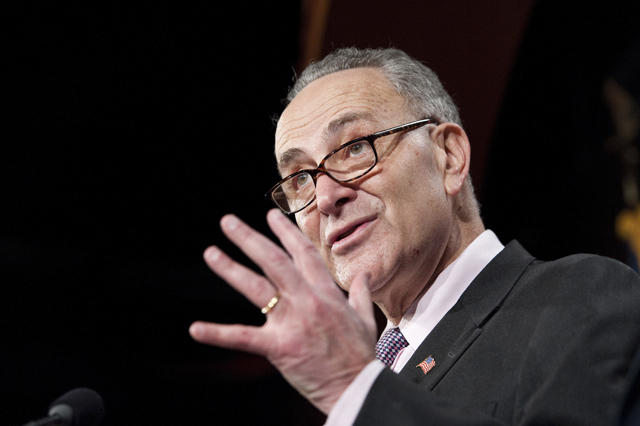Responding to record-high gas prices and a potential for further disruptions in supply, Sen. Chuck Schumer (D-NY) on Monday requested that the State Department pressure Saudi Arabia to increase its oil production.
The senator’s concerns are twofold: “Schumer called on the State Department to press the Saudis to publicly commit to meet their capacity potential to offset any current or future Iranian manipulation and bring down gas prices, worldwide,” reported a local broadcaster in Buffalo, NY.
This is the same senator who opposed construction of the Keystone XL pipeline, which could have worked toward both of Schumer’s ostensible objectives: reduced reliance on Iranian oil, and lower gas prices through an increase in crude supplies.
Schumer avoided some of the more heated rhetoric of his colleagues in discussing the pipeline, but his state director informed constituents on Feb. 14 that the senator “will be voting against the proposed amendment that includes Keystone XL and is working with Majority Leader Reid to defeat the amendment.”
Schumer was referring to an amendment to the highway funding bill currently under consideration that would authorize the pipeline route as initially conceived. If built, the pipeline could transport up to 830,000 barrels of Canadian oil per day to Gulf Coast refineries.
Critics of the pipeline argue that the pipeline is not worth building in the United States since much of the oil transported through the pipeline would be exported. Valero, a Texas oil company that was heavily involved with Keystone XL, said the “vast bulk” of Keystone oil would stay in the United States. But as Scribe pointed out at the time, American exports to Europe or other parts of the world would still reduce dependence on OPEC nations, including Iran.
TransCanada, the company responsible for Keystone, said it would move ahead with construction of a smaller pipeline within the United States – which does not need State Department approval – while the administration considers its new application for the full pipeline.
Like President Obama with respect to this new domestic pipeline, Schumer has no direct control over Saudi Arabia’s energy policies. Both could more proactive in addressing challenges posed by expensive oil and reliance on hostile regimes for it.

































9 Replies to “Schumer, Who Opposed Keystone XL, Calls for More Saudi Oil Production”